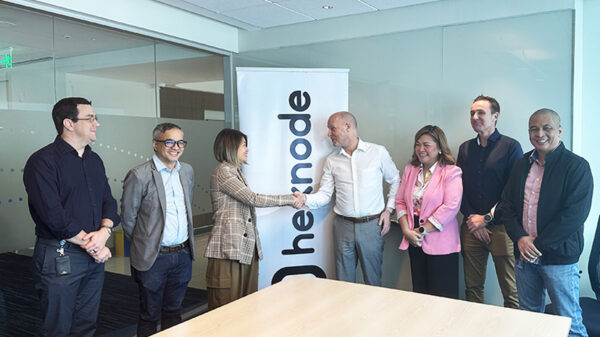The Philippines’ two telecommunications providers, PLDT and Globe Telecom, have agreed to establish a bilateral IP peering arrangement that will help improve local internet traffic quality and provide better internet experience for the subscribers of both telco operators.

L-R: Atty. Ray C. Espinosa, PLDT Head of Legal and Regulatory Group and member of the PLDT Board of Director; Ernesto R. Alberto, PLDT Executive Vice President and Head of Enterprise; Senator Bam Aquino; Gil Genio, Globe Chief Technology and Information Officer; and Ernest Cu, Globe President and CEO
With the peering arrangement, PLDT and Globe will now allow direct local exchange of traffic between PLDT’s Philippine Internet Exchange (PhIX) and Globe Internet Exchange (GIX) that is destined to each other’s own broadband and mobile customers.
Senator Bam Aquino witnessed the signing of the memorandum of agreement (MOA) between PLDT and Globe held in Makati Thursday.
“After six years of actively advocating for an IP peering, Globe welcomes PLDT’s decision to have a meaningful and applicable IP peering arrangement with us. We are happy with this landmark development considering the benefits to our customers in terms of internet experience,” said Gil Genio, Globe Chief Technology and Information Officer.
“With an effective domestic internet peering in place, Globe customers will gain direct access to content and applications hosted by PLDT data centers and vice-versa. We are confident that this agreement will redound to a better experience on internet services benefitting customers of both parties and the country as a whole,” he added.
“This is a very positive development and is in line with our digital pivot. We are focused on taking effective measures to improve internet services in the country. IP peering is one such measure. By keeping local traffic local, we improve the internet experience of both PLDT and Globe subscribers,” said Ernesto R. Alberto, PLDT Executive Vice President and Head of Enterprise.
“The other complementary effective measure is local caching. PLDT is working with global internet players like Google, Youtube, Facebook and Microsoft to store more popular internet content in the Philippines so Filipinos can access this more quickly. Caching is needed because about 90% of internet content frequently accessed by Filipinos come from overseas,” said Atty. Ray C. Espinosa, PLDT Head of Legal and Regulatory Group and member of the PLDT Board of Directors.
“Effective and efficient use of radio frequencies is another effective measure. Hence, Smart is quickly integrating the newly accessed frequencies from the San Miguel telco businesses into its mobile network rollout plan to provide additional capacity to handle the rapid growth of data traffic. Complementing this, PLDT has stepped up its investment in fiber to the home. We currently have about half a million fiber lines, with speeds of up to 1 Gbps already available in certain areas,” Espinosa added.
“The intention here is to keep local traffic within the country which should lower latency due to less hops and thus, should result in marked improvements in fixed broadband and mobile internet services in the country,” Alberto noted.
Under the agreement, Globe will put in a 10Gbps link and port for domestic peering between Globe and PLDT (GIX-PHIX). The bilateral domestic peering will cover PLDT-managed networks such as Smart, Sun and Digitel and the Globe networks that include Globe mobile, Bayantel, Ayalaport and Globe data center. The agreement, however, does not cover the Vitro Internet Exchange, which houses PLDT’s data centers as Globe already has an existing peering arrangement with Vitro involving a 10Gbps link.
The IP peering agreement means that content and applications hosted by the PLDT group which are being accessed by Globe customers will be treated as local content, and do not have to be routed overseas, causing additional IP transit costs, delay in data transmission and latency in downloading sites. About 20% of internet traffic is local, which means that traffic originates in the Philippines and terminates in the Philippines. As provided for in the agreement, both Globe and PLDT will provide a 3Gbps per month free traffic threshold.
Once implemented, the IP peering arrangement between the two telcos will keep a substantial portion of local data traffic in country, thus the elapsed transmission and reception time are kept to a minimum. This in turn allows for shorter access-to-response time, and faster access to applications. For customers, the browsing experience is better because delays and time outs are minimal. Gaming applications will also run smoothly.
IP Peering also helps minimize the country’s dependence on international cables and prevent a repeat of a 2008 incident where major international cables were damaged because of the Taiwan earthquake. The incident prevented Philippine customers from accessing local sites, government websites and local emails.
The MOA paves the way for the initial phase of bilateral peering which is localized IP traffic exchange between the PLDT Group broadband and mobile subscribers and Globe Group subscribers, which should be completed 30 days after the execution of the MOA. It also dictates that the two telcos will work towards executing a fuller bilateral peering agreement within 90 days after the initial phase has been accepted.


















































































































